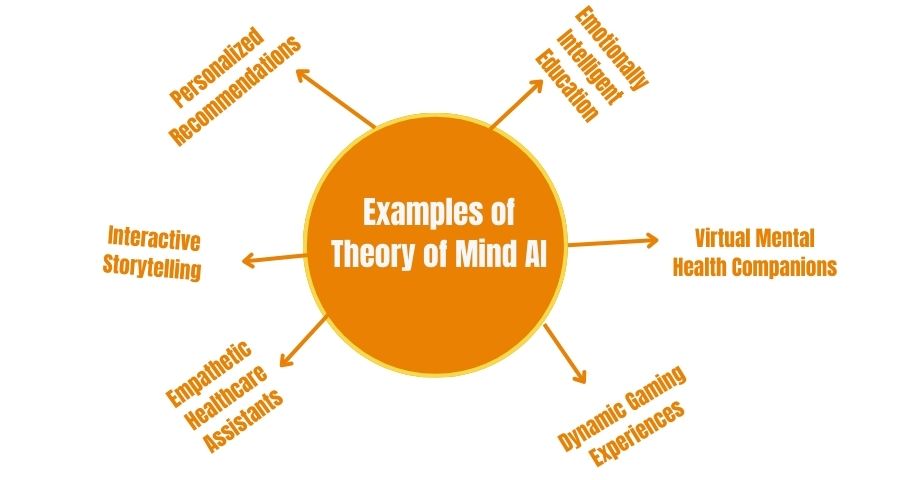Welcome, dear readers, to a journey into the charming kingdom of examples of Theory of Mind AI! Prepare to be surprised as we explore how artificial intelligence is growing to understand not just what we say, but also how we feel. Get ready for a rollercoaster ride of emotions, humor, and incredible technological advancements.
Definition of Theory of Mind AI

Theory of Mind AI refers to a branch of artificial intelligence that aims to imbue machines with the ability to understand and interpret the thoughts, beliefs, intentions, and emotions of others, much like humans do.
- Theory of Mind AI is like giving machines a heart and soul. It’s about more than just crunching numbers or following commands; it’s about understanding what’s going on inside someone’s head.
- Imagine if your computer could read your mind (in a non-creepy way, of course!). That’s the magic of Theory of Mind AI. It’s all about teaching machines to understand emotions, beliefs, and intentions, just like we do as humans. It’s like giving technology a dose of empathy and intuition, making interactions with machines feel more like interactions with a friend.
- With Theory of Mind AI, we’re not just talking about robots doing tasks; we’re talking about machines that can truly connect with us on an emotional level, making our lives richer and more meaningful. It’s an exciting frontier in the world of artificial intelligence, one that promises to revolutionize the way we interact with technology and each other.
Would you Like to Read: Examples of NLP
Examples of Theory of Mind AI
Here are 10 examples of theory of mind AI:
1. Personalized Recommendations:
In the realm of Theory of Mind AI, personalized recommendations are a shining example of technology’s ability to understand and anticipate human preferences. Platforms like Netflix, Spotify, and Amazon leverage sophisticated algorithms to analyze user behavior, preferences, and even emotions to suggest content tailored to individual tastes. By recognizing patterns in viewing or listening habits, these AI systems can predict what users might enjoy next, creating a more personalized and enjoyable experience.
2. Virtual Mental Health Companions:
Virtual mental health companions represent a promising application of Theory of Mind AI in providing support and assistance to individuals struggling with mental health issues. These AI-driven companions can offer empathetic listening, provide coping strategies, and even detect signs of distress based on user interactions. While not a replacement for human therapy, these virtual companions can supplement traditional mental health care and offer support to those in need, particularly in areas with limited access to professional services.
3. Interactive Storytelling:
Theory of Mind AI has opened up exciting possibilities in the realm of interactive storytelling, where narratives adapt and respond to user input and emotions. Video games, interactive books, and immersive experiences can now incorporate AI-driven characters that react dynamically to player choices and emotional cues. This creates a more engaging and immersive storytelling experience, blurring the lines between fiction and reality and allowing users to shape the narrative according to their preferences and emotions.
4. Autonomous Driving with Emotional Intelligence:
Autonomous vehicles equipped with Theory of Mind AI have the potential to revolutionize the transportation industry by providing safer and more comfortable rides. These vehicles can not only navigate traffic but also understand and respond to the emotions of passengers. By detecting signs of discomfort or stress, such as sweaty palms or increased heart rate, autonomous cars can adjust their driving behavior to ensure a smoother and more pleasant journey, enhancing passenger trust and confidence in self-driving technology.
5. Enhanced Customer Service:
Theory of Mind AI is transforming customer service by enabling chatbots and virtual assistants to understand and respond to human emotions. Instead of providing scripted responses, these AI systems can analyze the tone and context of customer queries to offer more empathetic and personalized support. By recognizing frustration, confusion, or satisfaction in customer interactions, AI-driven customer service agents can provide more effective assistance, leading to higher levels of customer satisfaction and loyalty.
6. Emotionally Intelligent Education:
In the field of education, Theory of Mind AI is being used to create personalized learning experiences that cater to the individual needs and emotions of students. AI tutors can adapt their teaching methods based on student performance, engagement levels, and emotional responses, providing tailored support and guidance. By understanding the unique learning styles and challenges of each student, these AI-driven educational tools aim to improve learning outcomes and foster a more inclusive and supportive learning environment.
7. Empathetic Healthcare Assistants:
AI-driven healthcare assistants equipped with Theory of Mind capabilities have the potential to revolutionize patient care by providing more empathetic and personalized support. These virtual assistants can analyze patient data, detect changes in emotional states, and offer tailored guidance and encouragement. Whether providing medication reminders, offering lifestyle recommendations, or simply lending a compassionate ear, these AI-driven healthcare assistants aim to improve patient outcomes and enhance the overall healthcare experience.
8. Dynamic Gaming Experiences:
Theory of Mind AI is transforming the gaming industry by creating dynamic and immersive gaming experiences where characters respond to player emotions and decisions. AI-driven NPCs (non-player characters) can adapt their behavior and dialogue based on player interactions, creating a more engaging and personalized gaming experience. By blurring the line between virtual worlds and reality, these AI-driven games aim to captivate players and offer endless opportunities for exploration and discovery.
9. Cognitive Therapy and Emotional Understanding:
AI-driven cognitive therapy tools are leveraging Theory of Mind AI to provide personalized interventions tailored to the emotional needs of individuals. These virtual therapy assistants can analyze user responses, detect patterns in emotional states, and offer guidance and support in managing stress, anxiety, and depression. By combining cognitive behavioral therapy techniques with empathetic understanding, these AI-driven tools aim to supplement traditional therapy methods and provide accessible mental health support to a broader population.
10. Social Robotics and Human-Robot Interaction:
Theory of Mind AI is paving the way for more natural and intuitive interactions between humans and robots. Social robots equipped with empathetic capabilities can understand human emotions, gestures, and social cues, allowing for more meaningful and authentic interactions. Whether assisting with household tasks, providing companionship to the elderly, or serving as educational aids for children, these AI-driven robots aim to bridge the gap between humans and machines and enhance the quality of life for users across various domains.

